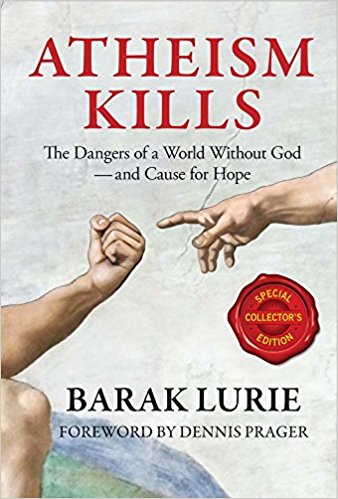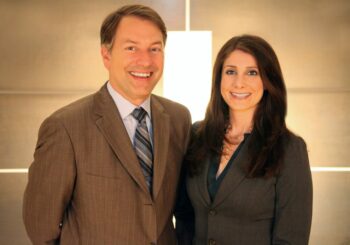 By Michael Ashcraft —
By Michael Ashcraft —
All of 11 years old, Barak Lurie embarked on a Socratic quest to discover truth, concluded there was no God, and pronounced himself an atheist.
“It’s a very easy thing for a child to become an atheist because it is a childish philosophy. If you come to the belief that you can’t see, hear, smell or touch God one way or the other, and then say, ‘Well, I can’t see Him. Therefore, He doesn’t exist,’” Lurie says.
But at Stanford University something unexpected happened: while many students watch their faith wither away under the unrelenting scorn of professors, Lurie, who is Jewish, found God.
Surprisingly, it happened as he undertook an undergraduate honors thesis to document the wicked massacres of organized religion.
What his research found was that atheism was responsible for 10 times more killings than Christianity: about 200 million in the last 80 years.
 Ultimately, Lurie, now 54, who is a profitable real estate/ business lawyer in a well-heeled Los Angeles neighborhood of Brentwood, turned his undergraduate research into an Amazon best-seller, Atheism Kills, published in 2017.
Ultimately, Lurie, now 54, who is a profitable real estate/ business lawyer in a well-heeled Los Angeles neighborhood of Brentwood, turned his undergraduate research into an Amazon best-seller, Atheism Kills, published in 2017.
Lurie was not raised in an observant Jewish home. While his parents believed in God, they didn’t impose faith on their son and attended synagogue only once a year, he says. His parents emphasized deep thinking and didn’t push him to replicate their faith.
“It’s not as if I read Nietzsche at age 11. It wasn’t any one influence that brought me to atheism. It was the lack of influences. Atheism is almost a natural state. If you’re not raised with God or Jesus, depending on your faith, you can easily end up with atheism in your pocket,” Lurie notes. “It was unique about me that I was very interested in God one way or another. I just chose not to believe in Him. I felt that one needed to take a stand on it.”
He lived in Connecticut at the time and attended a “very good” public school, where they rarely talked about God, if only to mock Him. Lurie brandished “a very poignant, very deep atheism.”
 “I was very into it. I could argue it. I wanted to find arguments for my atheism.” I pushed it by talking to other people about it. I would ask them, ‘Do you believe in God? Why do you believe in God? Isn’t that silly? Don’t you feel that God is just the caboose in a long line of other gods that were summarily rejected over time?”
“I was very into it. I could argue it. I wanted to find arguments for my atheism.” I pushed it by talking to other people about it. I would ask them, ‘Do you believe in God? Why do you believe in God? Isn’t that silly? Don’t you feel that God is just the caboose in a long line of other gods that were summarily rejected over time?”
His parents had a mild reaction to his lack of faith. “My dad felt that organized religion was detrimental to society,” Lurie says.
He journaled logical arguments against God and scoured Ayn Rand, the renowned American atheist. His atheism flourished ever stronger.
Then he studied economics and humanities at Stanford. Oddly enough, it was his choice of thesis that brought him back to God. Lurie set out to prove the famous atheist mantra; that religion has been responsible for the deaths of untold millions.
“I set out to prove it,” he says. “And as I set out to prove it, within two weeks of deep research I realized, ‘Man, I am really wrong on this.’ It was the weirdest feeling. It was an embarrassed feeling. I realized the information was right in front of me all this time. It wasn’t hard to find.”
But seeing that religion had been good and atheism had been bad throughout history didn’t mean God existed. He kept pondering and questioning.
 In philosophy classes, he realized his free will — and anyone’s free will — only exists as given by a Creator. True atheists, he says, are “determinists,” that is they are the sum total of all their influences and therefore not morally responsible for their actions. Adherents to the free-will outlook see themselves as responsible for their decisions.
In philosophy classes, he realized his free will — and anyone’s free will — only exists as given by a Creator. True atheists, he says, are “determinists,” that is they are the sum total of all their influences and therefore not morally responsible for their actions. Adherents to the free-will outlook see themselves as responsible for their decisions.
“Once I accepted that I had a free will, I opened the door to the possibility that there was a Creator,” he observes. “I started asking more questions: Where does beauty come from? Where does freedom come from? Where does our sense of scientific inquiry at all come from? Why do we have love? Why do we have art and music? I began to understand that these things are not explainable from a totally Darwinian perspective.
“In fact, everything we value — everything — you cannot explain through pure evolution,” he says. “Pure evolution is just biology. You cannot say that our humor is a product of evolution. It’s not as if two dogs get together and they survive because they tell jokes really well.”
Animals can’t appreciate the beauty of a sunset or the Mona Lisa. “Not one of our human values can be explained by evolution,” he notes.

In addition to the perplexing existence of values, Lurie also began to ponder the mind-bogglingly probabilities that the vast, organized and beautiful universe spontaneously generated.
“That notion that life could develop randomly is so far-fetched that if you are indeed a man of science, a man of logic, you should come to very clear conclusion: there must have been a creator that designed this,” he says. “The numbers are so staggeringly awful against the notion of atheism, against the notion of randomness.
“Even Stephen Hawkings, the famous atheist, knew that the probability of this universe happening from randomness is wildly infinitesimally bizarrely small, but he could not accept the notion of a Creator. So what did he do? He created a possibility in his own head of a multiverse.”

Hawkings’ speculation of the existence of parallel universes — the multiverse — improved the statistical chances of one of them generating organized life. It was a theory posited to shore up his crumbling atheism, Lurie maintains.
Lurie started his life-changing undergraduate thesis in his sophomore year. By the time he sat down to write it, he had puzzled out many profundities. Ultimately, he decided to focus on Fyodor Dostoevsky, the great Russian novelist.
“His writing reflected how he was rejecting his own atheism,” Lurie says. “He famously said, ‘You cannot truly appreciate God unless you have rejected God.’ I definitely resonate to that. There’s some wisdom to that.”
As an understanding of God welled up in his heart, Lurie wanted to rediscover his Jewish roots. He now attends synagogue regularly. After rejecting God for so many years, reorienting his thinking was cathartic and difficult, like learning a second language.

Lurie attended UCLA’s 4-year joint program of Law School and Business School (a JD MBA). He continued to explore his growing understanding of God by writing, including a novel, which he will be publishing soon.
“It was cool. I really discovered God in a deep way,” he says “I rediscovered everything. I picked up the pieces of everything I had rejected.”
Lurie initiated his law career in 1990 and specialized in litigation of real estate and business cases. He launched his own law firm in 2004, Lurie and Seltzer, which has powerful clients. One was Donald Sterling, former owner of the Clippers basketball franchise.
He’s a board member of Prager U, a non-profit that fights anti-semitism on colleges, Stand With Us, the Israel-supporting Jewish National Fund, and the Freedom Alliance in the fight to shore up Western Civilization’s values and heritage.
For eight years, he’s hosted the Barak Lurie show on KRLA at 10:00 a.m. on Sunday, which focuses on the big picture of politics, religion and law.
In 2010, he almost ran for Congress. He’s married with three children in elementary school.

Lurie’s book, Atheism Kills, stormed the market when it was released in 2017 because the argument is powerful. No one had written on the subject extensively. For three months, it was #1 on Amazon, he says.
“I hit gold with getting attention to it,” he says. “I did not expect it to do this well. Godlessness is not such a great thing. I don’t know of any book that speaks to this issue. I think it resonated. It met a particular niche and it cleaned up in that niche.”
His journey to faith has led him to embrace the same “organized religion” his father once eschewed.
“You need organized religion to develop a true sense of God,” he believes.
Along with fellow Jew Dennis Prager, Lurie loves Christians because born-again believers in Jesus adhere to almost identical ethics as devout Jews.
“Dennis Prager and I are close friends, and we share a lot how much we appreciate Christianity,” he says. “If you listen to my show you will hear how often I say, ‘Please Christians, make more Christians.’ We need more Christianity out there. I would love for this whole world to become Christian. Don’t get me wrong, I would love for a lot of Jews too. But this world could do really well if the rest of the world became Christian. We need people who subscribe to the Ten Commandments.”
If you want to know more about a personal relationship with God, go here
Mike Ashcraft pastors the Lighthouse Church in Van Nuys, CA.




What a marvelous testimony!!
I love his honesty. Without honesty, we cannot find God.
He says that the late Stephen Hawkins knew that the chance of the universe producing life was infinitesimally small, yet he stuck to his atheist guns!
We also need the Lord Himself to open our eyes.
The questions he asked himself, would have come from the Creator, who knows the thoughts of all hearts.
I pray Lurie comes to know and recognize Jesus as Messiah.
It’s not hard to realize that, it’s in Isaiah 53, Psalm 22 and other places.
I pray the right person will come to him and help him there.
God bless him.
Comments are closed.